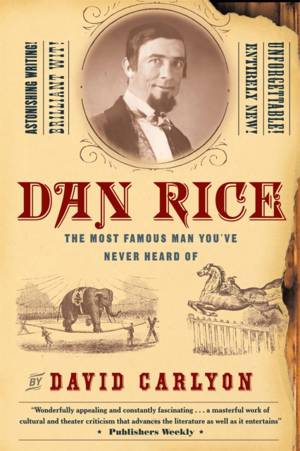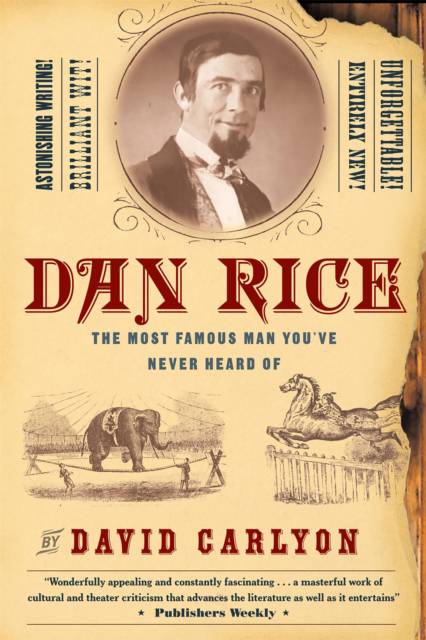
Je cadeautjes zeker op tijd in huis hebben voor de feestdagen? Kom langs in onze winkels en vind het perfecte geschenk!
- Afhalen na 1 uur in een winkel met voorraad
- Gratis thuislevering in België vanaf € 30
- Ruim aanbod met 7 miljoen producten
Je cadeautjes zeker op tijd in huis hebben voor de feestdagen? Kom langs in onze winkels en vind het perfecte geschenk!
- Afhalen na 1 uur in een winkel met voorraad
- Gratis thuislevering in België vanaf € 30
- Ruim aanbod met 7 miljoen producten
Zoeken
€ 39,95
+ 79 punten
Omschrijving
Dan Rice had many lives. He was a pig presenter, a strongman, a lecturer, and a comic singer, all before joining the dazzling world of the circus. In 1855, he created Dan Rice's Great Show. Labeling himself the "Great American Humorist," he toured the country and spoke out on issues of the day before large crowds. Swept up in a new cult of celebrity, he rose to become one of the most famous-and infamous-men in America. He even ran for president. So why have so few people ever heard of Dan Rice? Propelled by an urge toward "refinement," American amusements began to stratify in the mid-19th century. The raucous antebellum jumble of performers, audiences, and forms split along a new performance hierarchy of high and low. Circus, though still vastly popular, became seen as lowbrow. In that changed world, Rice's aggressive humor and robust connection with a noisy, participatory audience became seen as crude-and worse-a civic threat. David Carlyon weaves a remarkably rich portrait of turbulent times that raised one ambitious, creative man to glorious heights and then, embarrassed by its enthusiasm, buried him in sentimentality and finally oblivion.
Specificaties
Betrokkenen
- Auteur(s):
- Uitgeverij:
Inhoud
- Aantal bladzijden:
- 528
- Taal:
- Engels
Eigenschappen
- Productcode (EAN):
- 9781586482398
- Verschijningsdatum:
- 1/05/2004
- Uitvoering:
- Paperback
- Formaat:
- Trade paperback (VS)
- Afmetingen:
- 163 mm x 228 mm
- Gewicht:
- 780 g

Alleen bij Standaard Boekhandel
+ 79 punten op je klantenkaart van Standaard Boekhandel
Beoordelingen
We publiceren alleen reviews die voldoen aan de voorwaarden voor reviews. Bekijk onze voorwaarden voor reviews.









